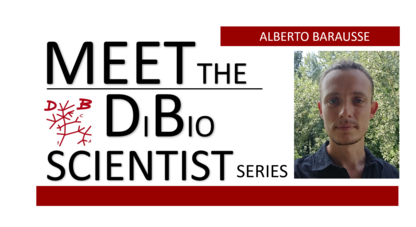
MEET THE DIBIO SCIENTIST SERIES : Alberto Barausse
Pubblicato il: 23.08.2019 11:42
Alberto has been recently appointed as a tenure-track researcher (RTDb) at DiBio
Can you summarize in few words your research?
My research aims to better understand human impacts on the environment and suggest solutions to reduce them. I mostly focus on water bodies, from rivers to wetlands and coastal seas, and on impacts such as fishing, nutrient enrichment, pollutants, and climate change. The common thread of my research is the “ecosystem approach” and the importance of quantifying processes to understand ecological dynamics and manage human activities sustainably. Right now I’m working with nutrient inputs to coastal areas and the resulting trade-offs between water quality, ecosystem productivity, fisheries, and biodiversity.
What is the most rewarding and the most challenging part of your work?
In both cases, linking research to management, that is, having an impact on the world out there with my research. That’s why I enjoyed so much working in the coordination of a salt marsh conservation project in the Venice lagoon (www.lifevimine.eu). But I believe you can have fundamental impacts also with communication, that’s why I really enjoy teaching or giving divulgation talks.
Tell us your story: what brings you to DiBio?
My background is in Environmental Engineering, and my academic career started as a marine ecosystem modeller at the LASA group (lasa.dii.unipd.it/) where I was lucky enough to take part to several EU research projects (Incofish, KnowSeas, WSTORE2, …), which allowed me to travel and build a network of international collaborations. Both my mentor at LASA - Dr. Luca Palmeri, and the coordinator of KnowSeas - the late prof. Laurence Mee, taught me the importance of using the “macroscope”, i.e. a big-picture socio-ecological perspective, when working with environmental management. While I’ve kept working on environmental modelling (e.g. of treatment wetlands, the food web impacts of emerging contaminants, the air dispersion of pollutants), later I moved to long-term ecological time series analysis and more theoretical ecology. I’ve also worked with conservation, studying Adriatic elasmobranchs population dynamics, and through the coordination of LIFE VIMINE, an EU project which aimed at protecting Venice Lagoon salt marshes from erosion through an “integrated approach” relying on nature-based solutions, stakeholder participation, and ecosystem services assessment.
What’s your favourite “toy” for research – and what can it do?
Ecological modelling was my first love, but I’d say that my favourite research “toy” is to bring together people with different backgrounds and skills (modelling, field work, lab skills, even social skills – have you ever worked with fishermen?, …) to work towards a common goal. This can sometimes be a bit tiring and messy, but also effective, and fun.
What are your interests outside science?
I love mountains. I also love long-distance running, in itself and as a chance to spend time in nature and explore the place where I live or that I’m visiting. I also like listening to music and playing the piano.
Alberto's website: https://scholar.google.it/citations?hl=it&user=CAHkO9gAAAAJ





